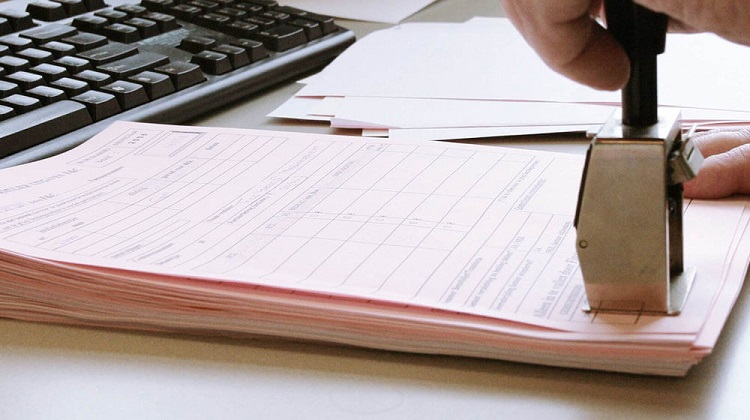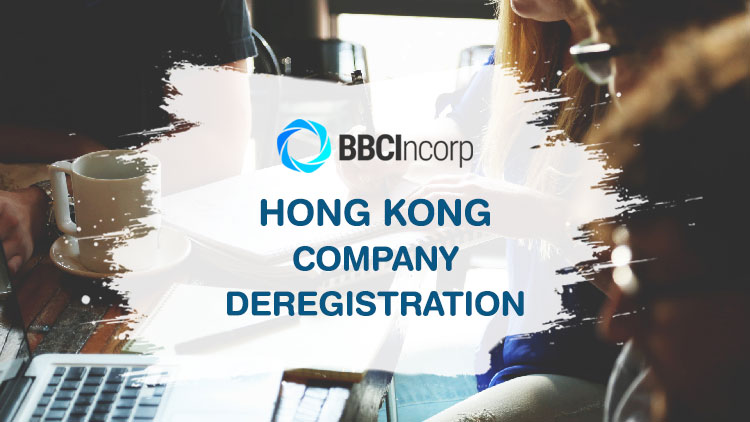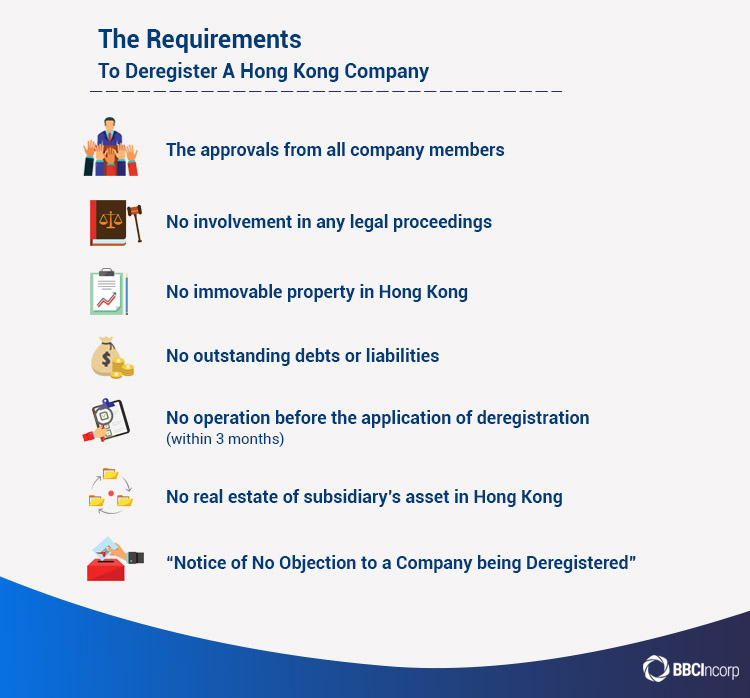It would be not an expected situation when you are running a business in Hong Kong but then come to a halt and need a close-down for your business.
Unfavorable market circumstances, the incapacity of generating profits or whatever a reason for your business failure may be, it is relatively crucial for any Hong Kong companies to understand how to legally dissolve the business as per the jurisdiction’s rules.
In this article, we will walk you through an essential guide to Company Deregistration in Hong Kong. This inexpensive and simple solution is one of the most widely-chosen among many methods of closing business like winding up or striking off. Let’s read on!
1. What are the different ways of closing a business?
Striking off, winding up and deregistration are three typical methods used to dissolve a company in Hong Kong. Yet, each process bears a significant distinct in the requirements as well as steps to be entailed.

- Deregistration
By virtue of its simplicity, inexpensiveness and quickly-done process, this is the most popular method.
Notwithstanding, there are some specific requirements in order that a defunct solvent company can be dissolved via the deregistration process.
- Winding up
The company will appoint a liquidator who is responsible for settling all the accounts to pay the company’s debts, liquidating the assets as well as distributing the net assets to members or shareholders, ensuring the company will be completely dissolved.
This method often contains more complicated steps and parties, taking much of your time and money as well. You can get more information about this method here.
- Striking off
Unlike the other two methods, striking off is a statutory power given by the Registrar of Companies. In other words, a company is not able to make the application for striking off itself, but it depends on the Registrar.
When your business in Hong Kong is no longer operating or conducting business, the Registrar will strike your company name off the Companies Register. And once your company name is struck off, the company will be dissolved.
Due to its convenience and simplicity, the deregistration process is much more preferred than the other two options. In what follows, we will delve into ins and outs of how company deregistration in HK works.
For a great idea of how to wind up a company in Hong Kong, discover our guide to winding up of Hong Kong companies.
2. What are the reasons for Hong Kong company deregistration?
It is totally unexpected for anyone to close their business, but it may be unavoidable under certain circumstances. There are dozens of reasons that can lead a business in Hong Kong to a deregistration process. Below are some popular examples for your reference:
- The company is in non-compliance with statutory obligations – i.e., improper administration of business affairs
- The business fails to conduct its business activities, leading it no longer profitable
- The enterprise has no ability to deal with the debts
- The company’s shareholders are arguing or falling out
- Corporate restructuring to which the company belongs
It should be noted that despite what reasons by which entrepreneurs wish to deregister their business, the deregistration for a Hong Kong company must be taken in an orderly process. Take a look at our following parts to come up with the idea of a comprehensive guide to this process!
3. How to deregister a company in Hong Kong?
Each jurisdiction has its own requirements and so does Hong Kong! From business registration to cancellation or dissolution, a set of sequential steps needs to be completed to close a Hong Kong business through the deregistration process. There are also several requirements for an eligible applicant to deregister a Hong Kong company. So, what are they? Let’s find out!
3.1. Condition for Hong Kong company deregistration
Please note that NOT all companies in Hong Kong can apply for deregistration in Hong Kong. A company who is “eligible” for this process must satisfy the following TWO criteria:
- Must be a local private company/a local company limited by guarantee, excluding those companies in section 749 (2) of the Companies Ordinance. *
- Must be a defunct solvent company
For those who are new to the terms of “Defunct” and “Solvent”, it is to indicate a company that is no longer operating any business and has no debts or liabilities.
749 (2) of the Companies Ordinance
- An authorized institution as defined by section 2(1) of the Banking Ordinance (Cap. 155);
- An insurer as defined by section 2(1) and (2) of the Insurance Ordinance (Cap. 41); (Amended 12 of 2015 s. 167)
- A corporation licensed under Part V of the Securities and Futures Ordinance (Cap. 571) to conduct business in any regulated activity as defined by section 1 of Part 1 of Schedule 1 to that Ordinance;
- An associated entity, within the meaning of Part VI of the Securities and Futures Ordinance (Cap. 571), of a corporation mentioned in paragraph (c);
- An approved trustee as defined by section 2(1) of the Mandatory Provident Fund Schemes Ordinance (Cap. 485);
- A company registered as a trust company under Part VIII of the Trustee Ordinance (Cap. 29);
- A company having a subsidiary that falls within above categories; or
- A company that falls into the above categories at any time during the 5 years immediately before the application under section 750 is made.
3.2. Requirements to deregister your company
Before sending an application for your Hong Kong company deregistration, you must meet the following criteria:
- The deregistration gets approvals from all company members;
- The company is not getting involved in any legal proceedings;
- The company has no immovable property which is located in Hong Kong;
- No outstanding debts or liabilities are available;
- No operation or business has been conducted within 3 months before the application of deregistration;
- In case of a holding company, none of its subsidiary’s assets has immovable property located in Hong Kong;
- The company has got a “Notice of No Objection to a Company being Deregistered” (or also known as “Notice of No Objection”) delivered by the Commissioner of Inland Revenue.
3.3. Deregistration process for defunct solvent company in Hong Kong
As aforementioned, the process of deregistration for a Hong Kong company is simple, easy and affordable.
You can result in your HK deregistration business with a 2-step order as below:
Step 1: Obtain a Notice of No Objection issued by the Inland Revenue Commissioner
In order to apply for a “Notice of No Objection”, you need to fill in the Form IR1263.
You could download it from the website of the Inland Revenue Department. Then, submit the form together with a non-refundable fee to the Inland Revenue Department.
Step 2: Deliver documents to the Companies Registry
After the receipt of the Notice of No Objection, you have to send the below documents to the Companies Registry:
- The original copy (hard copy, or certified copy if via electronical deliver) of the “Notice of No Objection”;
- A completed Form NDR1, plus a required fee of HK$420 which is non-refundable in any cases;
- Additional information requirement may have in some cases.
3.4. Company deregistration period in Hong Kong
The entire process for company deregistration in Hong Kong typically takes around 5 months.
At first, if nothing goes wrong with your documents, you can receive a letter approval for the deregistration application within 5 working days. The Company Registrar in the Hong Kong Gazette will publish a notice of the proposed deregistration.
During 3 months since the published date, if there has been no objection to your deregistration, then the Registrar will proceed to issue the second notice (the final one) to inform your business to be deregistered. In parallel to the final notice announced, the dissolved company is official.
Similarly, the applicant/nominated person in the application will receive the company deregistration advice.
Having troubles with closing down your business? Visit our Company Dissolution and Restoration page for professional support on this matter.
4. Other considerations for company deregistration in Hong Kong
There are further considerations that you need to know before and after applying for your company deregistration in Hong Kong.

The 3 common deregistration relative matters that you should be in your What-to-do list:
4.1. Disposal of company property
Before delivering the application for your HK company deregistration to the competent authority, make sure you have done the disposal of your company property in an appropriate way.
In accordance with the Hong Kong regulations, all the company’s property – credit balance in the business bank accounts, landed property or motor vehicle to name a few, will be considered as bona vacantia. All of these assets, upon the dissolution of your company, must be held by the Hong Kong Government’s Special Administrative Region.
In case you still wonder about how to properly dispose of your business assets, you could take advices with professional experts for further information.
4.2. Annual returns requirements
Your Hong Kong business must still satisfy all compliance requirements under the Companies Ordinance until the deregistration of your company is official. To simply put, after making the application for deregistration, you still have to maintain your liabilities of:
- Filing Annual Returns;
- Notifying the Companies Registry the situation of your address of registered office if any change occurs. In this case, you should deliver a Form NR1 to report the changes.
- Giving notices of change(s) of company secretary and director(s) as well as their particulars for registration. In this case, a Form ND2B should delivered to report the changes.
Note that any Hong Kong company which fails to fulfill its statutory obligations must be liable to legal penalties. Make sure you are full aware of all liabilities and relevant procedures to make your deregistration process run smoothly.
To get a good understanding of compliance duties for a company in Hong Kong, check out our article on Hong Kong Company Annual Compliance Requirements
4.3. Restoration of a deregistered company
Should “Can I restore my deregistered company?” be a matter of concern to you, then the answer is Yes. What you need to do to restore your company which has been dissolved via deregistration is to submit an application to the Court of First Instance (pursuant to section 765(2) under the Companies Ordinance).
Note that the restoration procedure generally will take you about 2 months. For what documents to prepare and how this procedure should be followed, you should seek advice from professional experts for further details.
5. Conclusion
In summary, company deregistration in Hong Kong is a very popular option for business when it comes to how to close a company affordably and quickly.
However, there are still some certain conditions for the eligibility of applicants that you should take into account.
It is also crucial to understand a standardized process of dissolving your business via deregistration, along with some statutory obligations involved as per the request of the Hong Kong Government.
So, it is advisable that you engage reliable expert firms to help your business achieve a simple, transparent and time-saving process.
Should you need more information regarding how to deregister your business in Hong Kong, do not hesitate to contact us via email service@bbcincorp.com, or drop us a live chat message!




